
Water Resources
Scope & Guideline
Navigating the challenges of water resource sustainability.
Introduction
Aims and Scopes
- Hydrological Modeling and Simulations:
The journal publishes research on various hydrological models, including numerical simulations of river flows, flood dynamics, and water balance assessments, emphasizing their applications in real-world scenarios. - Water Quality Assessment:
A core area of focus includes the evaluation of water quality across different water bodies, utilizing various chemical, biological, and statistical methods to analyze pollutants, nutrient loads, and ecological impacts. - Impact of Climate Change on Water Resources:
Research often addresses the implications of climate change on hydrological cycles, water availability, and water quality, including studies on droughts, floods, and changing precipitation patterns. - Groundwater Studies:
The journal features studies on groundwater dynamics, quality assessments, and the interactions between surface water and groundwater, highlighting the importance of sustainable management practices. - Ecological and Environmental Impacts:
Investigations into the ecological effects of hydrological changes, pollution, and anthropogenic activities on aquatic ecosystems form a significant part of the journal's scope. - Transboundary Water Management:
Research addressing the challenges and strategies for managing shared water resources, particularly in transboundary river basins, is a recurring theme. - Innovative Water Management Techniques:
The journal promotes research on innovative approaches to water resource management, including the application of remote sensing, GIS technologies, and machine learning in hydrological studies.
Trending and Emerging
- Climate Resilience and Adaptation:
There is an increasing focus on research that addresses climate resilience, emphasizing adaptive management strategies for water resources in the face of climate variability and extreme weather events. - Microplastics and Pollution Studies:
Emerging studies on microplastics and their impact on water quality and aquatic ecosystems are gaining traction, reflecting growing environmental concerns and regulatory pressures. - Integration of Remote Sensing and GIS in Water Studies:
The use of remote sensing and GIS technology for hydrological modeling, water quality assessment, and land-use impact analysis is becoming more prevalent, showcasing advancements in data collection and analysis. - Socio-Ecological Water Management:
Research that integrates social and ecological dimensions of water management is on the rise, recognizing the importance of community involvement and ecosystem services in water resource governance. - Artificial Intelligence and Machine Learning Applications:
The application of AI and machine learning techniques in hydrological modeling, water quality prediction, and resource optimization is a rapidly growing area, reflecting technological advancements in data analysis. - Water-Energy-Food Nexus:
Studies exploring the interconnections between water, energy, and food security are emerging, highlighting the need for integrated approaches to address global sustainability challenges.
Declining or Waning
- Historical Hydrology Studies:
Research centered on historical hydrology and paleohydrological reconstructions seems to be less frequent, possibly due to a growing emphasis on contemporary issues and immediate water resource challenges. - Traditional Water Management Practices:
There is a noticeable decline in studies focused solely on traditional water management practices, as the field increasingly shifts towards integrated and sustainable approaches that consider ecological impacts. - Localized Case Studies:
While localized studies remain important, there is a trend towards broader, regional assessments and comparative studies that encompass multiple sites, indicating a waning interest in isolated case studies. - Non-Quantitative Research:
There appears to be a decrease in qualitative research approaches that do not employ rigorous quantitative methods, as the journal's emphasis on data-driven studies continues to grow.
Similar Journals

JOURNAL OF THE AMERICAN WATER RESOURCES ASSOCIATION
Exploring the depths of water science for a sustainable tomorrow.The JOURNAL OF THE AMERICAN WATER RESOURCES ASSOCIATION, published by Wiley, is a premier platform dedicated to advancing the field of water resource management and research. With an ISSN of 1093-474X and an impressive Q1 ranking in multiple categories, including Earth-Surface Processes, Ecology, and Water Science and Technology, this journal serves as a vital resource for professionals, researchers, and students alike. Established in 1967 and set to converge through 2024, it has consistently published cutting-edge research that influences policy and practice in water resource management. The journal's open access option enhances its reach, ensuring that critical findings are accessible to a wider audience. The Scopus rankings further underscore its impact, placing it in the top quartile within its fields, highlighting its importance in shaping scholarly discourse. As a significant contributor to the understanding and management of freshwater systems, the journal offers a crucial means for sharing insights and fostering collaboration in the vital realm of water resources.
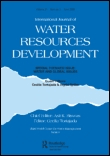
INTERNATIONAL JOURNAL OF WATER RESOURCES DEVELOPMENT
Pioneering insights for effective water resource development.The INTERNATIONAL JOURNAL OF WATER RESOURCES DEVELOPMENT, published by ROUTLEDGE JOURNALS, TAYLOR & FRANCIS LTD, stands as a premier platform for disseminating cutting-edge research in the fields of water resources management and sustainable development. With an impressive impact factor indicated by its Q1 ranking in both Development and Water Science and Technology categories, this journal is pivotal for researchers and professionals seeking to advance their understanding of water-related challenges and solutions. Covering a broad spectrum of topics, it features contributions from leading experts, making it an essential resource for both academic inquiry and practical application. Although it does not currently offer Open Access, the journal's rigorous peer-review process ensures high-quality scholarship from 1983 to the present, reinforcing its role in shaping policies and practices globally. The journal is indexed in Scopus with notable rankings in Social Sciences and Environmental Science, highlighting its influence and reach within these vital sectors.
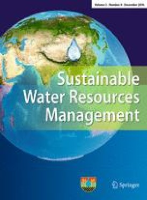
Sustainable Water Resources Management
Empowering interdisciplinary dialogue on water sustainability.Sustainable Water Resources Management is an esteemed journal focusing on the critical field of water resource management in the context of sustainability. Published by Springer International Publishing AG, this journal serves as a vital platform for researchers, policymakers, and practitioners to disseminate cutting-edge research and innovative practices aimed at addressing global water challenges. With an impressive impact factor aligned with its Q2 ranking in Water Science and Technology and Q3 in Renewable Energy, Sustainability, and the Environment, it maintains a robust reputation in its field, evidenced by its Scopus rankings. Covering a diverse range of topics from integrated water resource management to the nexus between water and energy, Sustainable Water Resources Management is committed to fostering knowledge exchange and encouraging interdisciplinary dialogue among its audience. This journal, operating under strict academic rigor, plays an essential role in advancing sustainable practices and is open from 2015 to 2024, making it a relevant resource in today’s rapidly evolving environmental context.
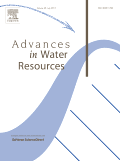
ADVANCES IN WATER RESOURCES
Advancing water science for a sustainable future.ADVANCES IN WATER RESOURCES is a premier peer-reviewed journal published by Elsevier Science Ltd, dedicated to advancing the field of water science and technology since its inception in 1977. With an impressive Q1 ranking in the field, this journal provides a vital platform for researchers, professionals, and students to disseminate cutting-edge research that addresses critical issues related to water resources management, hydrology, and environmental sustainability. The journal offers a comprehensive collection of articles that explore innovative methodologies, policy implications, and case studies that shape the future of water resource management. Although it does not provide open access, its impactful contributions are recognized globally, making it an essential resource for anyone engaged in water science. The journal continues to publish relevant research while looking forward to bridging the gap between theoretical insights and practical applications up until 2024.
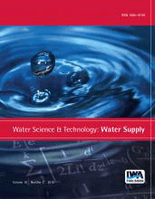
Water Supply
Fostering excellence in water science and technology.Water Supply is an esteemed journal published by IWA PUBLISHING that plays a pivotal role in the field of water science and technology. With an ISSN of 1606-9749 and an E-ISSN of 1607-0798, this journal has been a key resource for researchers and professionals since its inception in 2001. Now covering a wide range of topics until 2024, it is recognized for its impactful contributions, holding a Q2 ranking in the Environmental Science: Water Science and Technology category, and currently stands at rank #125 out of 261 in Scopus, reflecting its relevance and influence in the academic community. The journal aims to disseminate significant research findings and innovations in water supply management, ensuring that professionals and students are equipped with the latest knowledge and practices in the sector. Despite not being an open-access journal, Water Supply continues to attract high-quality submissions that enhance our understanding and preservation of vital water resources. For those invested in sustainable water practices, this journal is an invaluable tool for continued learning and advancement.
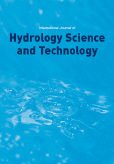
International Journal of Hydrology Science and Technology
Shaping the Future of Hydrology with Cutting-edge ResearchThe International Journal of Hydrology Science and Technology, published by InderScience Enterprises Ltd, is a distinguished platform dedicated to advancing knowledge in the field of hydrology, environmental engineering, and water science. With an ISSN of 2042-7808 and an E-ISSN of 2042-7816, this journal, established in 2011 and continuing through 2024, serves as an essential resource for researchers, professionals, and students alike. Despite being categorized in the Q3 quartile across multiple disciplines including Earth and Planetary Sciences, Environmental Engineering, Waste Management and Disposal, and Water Science and Technology, the journal maintains a reputation for contributing significant findings that impact both theory and practical applications in addressing hydrological challenges. Currently unavailable through Open Access options, the journal remains committed to disseminating valuable research that informs sustainable practices in water resource management. The editorial team encourages submissions that explore innovative strategies and methodologies while fostering interdisciplinary discussions, making this journal a pivotal player in shaping the future of hydrological science.

Water Conservation Science and Engineering
Exploring Interdisciplinary Approaches to Water ManagementWater Conservation Science and Engineering, published by SPRINGERNATURE, is a vital academic journal dedicated to advancing the fields of environmental engineering, ocean engineering, waste management, and water science and technology. Since its inception in 2016, the journal has quickly established itself within the academic community, achieving a commendable Q3 ranking across multiple categories in 2023. With an ISSN of 2366-3340 and an E-ISSN of 2364-5687, it is accessible to a global readership eager to explore the latest research and innovations in water conservation and sustainable practices. Although currently not open access, the journal is committed to publishing high-quality scholarly articles that provide insights into effective water management strategies, innovative engineering solutions, and the critical importance of preserving our water resources. Based in Singapore, Water Conservation Science and Engineering aims to foster interdisciplinary collaboration among researchers, professionals, and students, making it an essential resource for anyone passionate about environmental sustainability and preservation.

WATER RESOURCES MANAGEMENT
Advancing Knowledge in Water Resource SolutionsWATER RESOURCES MANAGEMENT is a prestigious journal published by SPRINGER, renowned for its contribution to the fields of Civil and Structural Engineering as well as Water Science and Technology. Operating since 1987, this journal has established itself as a vital resource for researchers, professionals, and students alike, boasting a remarkable impact factor and a Q1 designation in both relevant categories as of 2023. The journal is indexed in Scopus, achieving commendable ranks—34th in Environmental Science and 62nd in Civil and Structural Engineering, placing it in the top percentiles of its fields. Although it does not offer open access, WATER RESOURCES MANAGEMENT serves as a comprehensive platform for disseminating innovative research, discussions, and case studies that address the global challenges of water resource management. With a commitment to fostering knowledge and advancing the understanding of integrated water management solutions, this journal is indispensable for anyone engaged in these critical scientific domains.
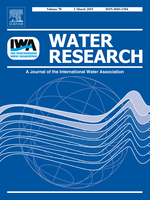
WATER RESEARCH
Exploring innovative solutions for global water challenges.WATER RESEARCH, published by Pergamon-Elsevier Science Ltd, is a premier international journal dedicated to the advancement of knowledge in the interdisciplinary field of water science and technology. With a significant impact factor, WATER RESEARCH holds a distinguished position, consistently ranking in the top quartile (Q1) across multiple categories including Civil and Structural Engineering, Environmental Engineering, and Pollution. Established in 1967 and set to continue its legacy until at least 2024, this journal provides a vital platform for researchers and professionals to disseminate cutting-edge findings related to water sustainability, quality, and management. Although the journal follows a traditional access model, its commitment to disseminating impactful research ensures that it remains an essential resource for academia and industry alike. With a rigorous selection process, the journal includes articles that significantly contribute to the understanding and resolution of global water-related challenges, making it an invaluable asset for researchers, students, and practitioners engaged in this critical area of study.
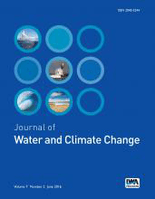
Journal of Water and Climate Change
Empowering Sustainable Solutions for a Changing ClimateJournal of Water and Climate Change is a premier open-access journal published by IWA Publishing, dedicated to advancing the understanding of the interplay between water resources and climate change. With an ISSN of 2040-2244 and an E-ISSN of 2408-9354, this journal has established itself as a crucial platform for interdisciplinary research, publishing high-quality articles that address the challenges posed by climate variability on water systems globally. Since achieving open access status in 2021, the journal has fostered wider dissemination of knowledge among its audience, featuring works that span pivotal topics in Atmospheric Science, Global and Planetary Change, and Water Management. Notably ranked within the top quartiles in several relevant categories as of 2023, it occupies a vital position in the academic community, offering insights that are essential for policymakers, environmental scientists, and researchers striving to create sustainable solutions for water and climate challenges. Its commitment to excellence is reflected in its strong Scopus rankings, standing at the 66th percentile in Water Science and Technology and 65th percentile in Management, Monitoring, Policy, and Law. Located in the United Kingdom, this journal not only serves as a repository of cutting-edge research from 2010 to 2024 but also engages a diverse readership passionate about promoting sustainable water management practices.